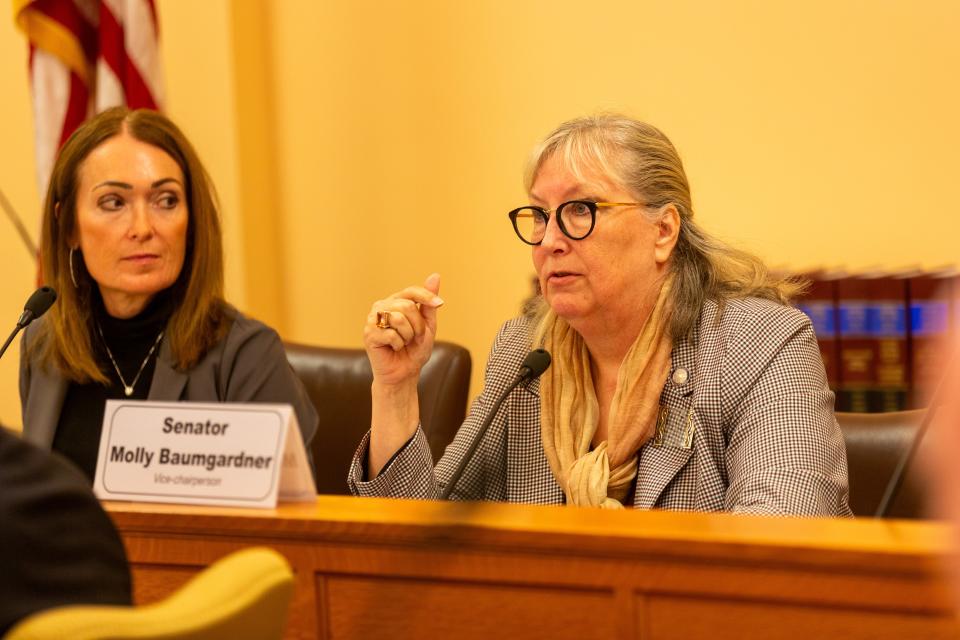Consequences could be on the way for Kansas schools that misspend at-risk student funding
Republican lawmakers are eying punitive measures for Kansas school districts, including potentially having them repay state aid meant to target students who are the highest risk of not graduating, after a state audit found that administrators haven't followed strict guidelines for those funds.
Among several other education issues, the Kansas Legislature’s Special Committee on Education honed in on the results of a report this summer from the Kansas Legislative Post Audit that examined how schools used more than $400 million in at-risk funding during the 2021-22 school year.
As part of the Kansas school funding formula, schools receive weighed, per-student funding that is supposed to be spent on “above and beyond” instruction and intervention for students who are at risk of not graduating.
Although school districts receive the funding based on the number of students enrolled who qualified for free- and reduced-price lunches, those figures are simply a proxy. At-risk students are those deemed by school districts to not be meeting academic standards, failing or missing too many classes and exhibiting other similar risk factors.

Audit of Kansas school districts finds improper spending for at-risk students
The audit, released over the summer as a follow-up to a 2019 audit, had found several continuing deficiencies in the way schools have been spending that funding, as well as manner in which the Kansas State Department of Education guides and oversees that funding.
Under state law, schools can only spend at-risk funding on evidence-based programs that are approved by the Kansas State Board of Education and backed by peer-reviewed research that shows improved outcomes for at-risk students over a five-year period.
Additionally, funding has to be used on direct instruction or programs for at-risk students. That includes items like high school credit recovery, one-on-one tutoring, homework assistance, after-school and summer school. State law, however, excludes other types of non-direct expenses like administrative costs, programs or staff time meant for general instruction, and similar items.
Auditors found that out of the 40 programs they selected to review from the state board’s approved list, only 17 were backed by peer-reviewed research, and no program had research that looked at student outcomes over a five-year period.
Separately, a sample of 20 of Kansas’ nearly 300 public school districts found that schools had misspent approximately 30% of the $5.2 million in at-risk expenditures reviewed by auditors on other unallowable expenses.
That included spending on items such as salary for non-at-risk staff, televisions, and a subscription to Sam’s Club.
However, auditors emphasized they could not project the percentage of misspent funds to the broader pool of at-risk funding in Kansas, since they specifically focused on $5.2 million in potentially questionable expenses as part of the 20 districts’ overall pool of $175.7 million at-risk dollars.
Kansas Republicans want consequences for school districts that misuse at-risk dollars
Craig Neuenswander, deputy commissioner at the Kansas State Department of Education, defended what he said were mistakes and misunderstandings. He said the agency and local districts have always worked to remain in compliance with state at-risk funding law, but that there have been occasional miscommunications as to what is allowed or prescribed by the law.
He said even the auditors admitted it is difficult, if not impossible, for KSDE to list and recommend at-risk programs that fully fit the letter of the law. Few, if any, evidence-based programs study student achievement and performance over the five-year period required by state statute.
Still, Republicans on the joint committee seized on what they deemed wasteful and misguided spending. They highlighted declining state assessment scores as evidence of school district’s ineffective use of at-risk funding, especially after lawmakers have added several limits and regulations to at-risk funding over the past several years.
More: Kansas schools are seeing record numbers of special education students, and fewer teachers
KSDE does not track academic performance specifically for at-risk students, with auditors instead using free and reduced-price as a proxy.
“I want the Legislature to see why there continues to be a misunderstanding of how the money is to be spent,” said Sen. Molly Baumgardner, R-Louisburg. “It isn’t for memberships. It’s not for post-prom. It’s not for a copy machine. It’s not for a big-screen monitor.”
Throughout the hearing, the Republican lawmakers suggested that the Legislature should revisit the at-risk funding statute next spring.
More: School choice looms large as 2024 political battlefield. Here's what education leaders say
One possible solution would be to have the Legislature put in consequences for misspent dollars, beginning with paying those funds back, Dave Trabert, CEO of the Kansas Policy Institute, told the committee. KPI is a conservative nonprofit organization that has been critical of public schools’ academic performance and has lobbied for school choice.
Trabert also told lawmakers they should tie continued funding to actual improved academic performance, suggesting they require an annual 10% reduction in the number of students performing “below grade level” on the state assessments.
“There needs to be a sense of urgency,” he said. “I’m not seeing it, and I don’t think many of us have seen it for many years. Until we shift from ‘process’ to getting to where results matter, we’re not going to see a change.”
Rafael Garcia is an education reporter for the Topeka Capital-Journal. He can be reached at rgarcia@cjonline.com or by phone at 785-289-5325. Follow him on Twitter at @byRafaelGarcia.
This article originally appeared on Topeka Capital-Journal: Kansas lawmakers question school districts' use of at-risk funding

